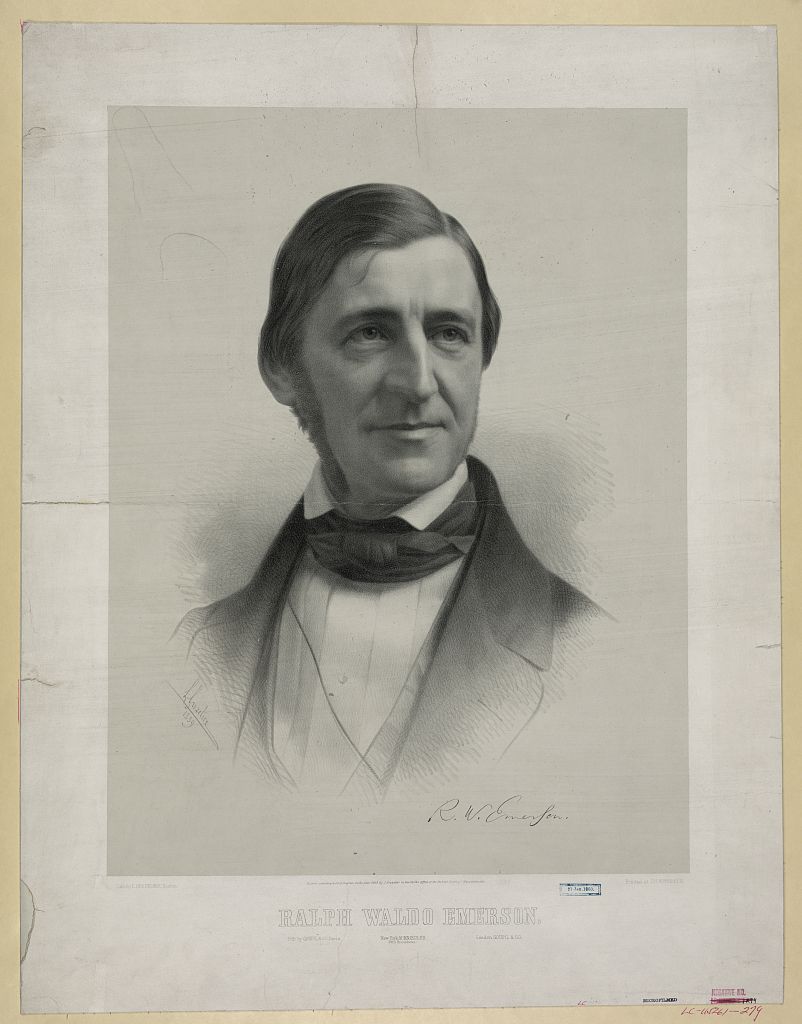Author Bibliography (in progress)
Emerson, Ralph Waldo (1803-1882)
BIOGRAPHICAL NOTE
Ralph Waldo Emerson was born in Boston on 25 May 1803, one of eight children of Ruth Emerson (née Haskins) and Unitarian minister Rev. William Emerson. His father died just before Emerson's eighth birthday, and he was subsequently raised by his mother and other women of the family, particularly his aunt Mary Moody Emerson. He initially followed his father into the ministry, having been accepted into the Harvard Divinity School in 1824. He was ordained on 11 January 1829 to serve as pastor in Boston's Second Church. The same year, he married Ellen Louisa Tucker, who died from tuberculosis just two years later. Finding the institution unsuitable, antiquated, and limiting, he resigned his office in 1832. He toured Europe in 1833 and his visit to the Jardins des Plantes in Paris was the site of an epiphany with respect to the interconnectedness of all things in nature. Among others, he met William Wordsworth, Samuel Taylor Coleridge, and  Thomas Carlyle in England. He maintained correspondence with the latter until Carlyle's death in 1881.
Thomas Carlyle in England. He maintained correspondence with the latter until Carlyle's death in 1881.
In 1834, Emerson moved to Concord and the intellectual circle comprised of Nathaniel Hawthorne, Henry David Thoreau, A. Bronson Alcott, and Margaret Fuller. In 1835, Emerson married Lydia (Lidian) Jackson. A sizable inheritance from his first wife allowed him to support his family throughout the rest of his life. 1836 was a pivotal year marked by the publication of his first essay, “Nature,” and the establishment of the Transcendental Club. In 1842 he succeeded Fuller as editor of the Transcendentalist journal, The Dial.
An increasingly staunch Abolitionist, Emerson was a sympathetic but critical contributor to discussions on social reform. In 1840, George Ripley tried to convince Emerson to join or financially support his plan for the Utopian community of Brook Farm. Ripley was unsuccessful, but Emerson visited Brook Farm and a few years later served as trustee for Fruitlands, the reform community devoted to the principles of ethical veganism established by his friends Alcott and Charles Lane. With Ellery Channing, he visited Fruitlands in July 1843, noting in his journal that “[y]oung men and young maidens, old men and women, should visit them and be inspired” (Vol. VI. 421). Some later writers, such as John Harvey Kellogg in his essay “Shall We Slay to Eat?” (1899), believed Emerson to be vegetarian. It appears that he was not, nor was he particularly interested in animal rights, but his writing provides a valuable contextual perspective on reformers of the day, including Grahamites, about whom he writes frequently in his journals, the Fruitlands community, the Shakers, the Temperance movement, and Abolitionists. Emerson subscribes to a philosophy of living simply and truthfully; this means he abhors hypocrisy (and finds many reformers guilty of it) and believes that it is impossible to make reforms in one area alone. Thus, if reforms are to be intersectional it is best to live simply, quietly, and independently, to live from one’s own labor, and to eat outside in the sun. In “Conduct of Life” (1860) he writes, “Let us learn to live coarsely, dress plainly, and lie hard. The least habit of dominion over the palate has certain good effects not easily estimated. Neither will we be driven into a quiddling abstemiousness. 'T is a superstition to insist on a special diet. All is made at last of the same chemical atoms” (154), which reflects his insistence on simplicity in reform in order to prevent hypocrisy, and to live in an harmonious state of (and with) nature. Emerson died on 27 April 1882.
IMAGE: Ralph Waldo Emerson / L. Grozelier 1859 ; lith. by L. Grozelier, Boston. Library of Congress.
PUBLICATIONS
Last updated on March 1st, 2024
SNSF project 100015_204481
@VLS@veganism.social | VeganLiteraryStudies | @veganliterarystudies |
